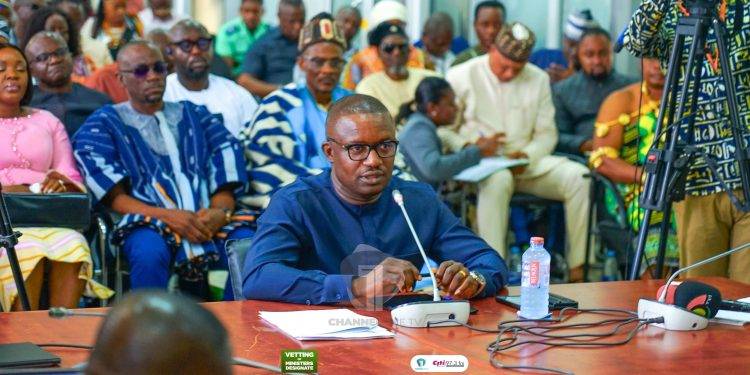In a bid to revitalize the struggling Electricity Company of Ghana (ECG), the government is set to establish a seven-member committee to explore privatization options for the state-owned utility provider. Energy Minister-Designate John Abdulai Jinapor announced this development during his vetting by Parliament’s Appointments Committee on January 13, 2025.
This initiative aims to address the long-standing inefficiencies, financial losses, and mounting debt that have plagued ECG for years, significantly hampering its ability to deliver reliable electricity to households and businesses across the nation.
### Privatization as a Path to Recovery 


John Jinapor, while addressing the Committee, stressed the need for private-sector participation in ECG's operations. He explained that such involvement could provide the much-needed expertise, resources, and operational efficiency to transform the company's fortunes.
"We believe there should be private sector participation," Jinapor stated firmly. "Privatization, or a form of it, is not just about selling off assets; it’s about introducing innovation, discipline, and accountability into ECG's operations to ensure the consistent and reliable supply of electricity across Ghana."
The Energy Minister-Designate emphasized that the committee’s role would be to examine and recommend viable privatization models that align with Ghana's specific energy needs and economic goals.
### Challenges Facing ECG
For years, ECG has been riddled with challenges, including operational inefficiencies, poor revenue collection systems, and excessive debt burdens. These issues have led to significant financial losses, straining the energy sector and limiting the company’s capacity to meet demand.
Jinapor revealed that ECG's inefficiencies are compounded by mismanagement and contractual commitments that have drained its resources. Despite several attempts at reform in the past, these efforts have failed to yield lasting improvements, necessitating a new approach.
He acknowledged the criticisms surrounding privatization, particularly fears that it could lead to job losses or higher electricity tariffs. However, he assured the public that the process would prioritize the interests of Ghanaians and the sustainability of the energy sector.
### Committee to Lead Transparent Process
The proposed seven-member committee will be tasked with developing a transparent framework for private-sector involvement in ECG. According to Jinapor, the committee will comprise neutral and competent professionals who can objectively evaluate the company’s challenges and propose solutions without political interference.
“We will stay off as politicians and let them develop a framework in a transparent, open, and frank manner. Once we get the buy-in of Ghanaians, we can set standards using a Request for Proposal (RFP) or competitive tender process,†Jinapor explained.
This non-partisan approach, he noted, is essential to ensuring public confidence in the privatization process and avoiding the pitfalls of previous reforms.
### Lessons from the Past
The push for privatization comes on the heels of previous attempts to involve private entities in the management of ECG. One notable example is the Power Distribution Services (PDS) arrangement, which was terminated in 2019 amid allegations of fraud and non-compliance with contractual terms.
Jinapor assured the Committee that lessons had been learned from the PDS debacle and that this new process would be conducted with greater diligence and oversight.
“The mistakes of the past will not be repeated,†he said. “We are committed to ensuring that this process is thorough, transparent, and ultimately beneficial to the people of Ghana.â€
### Public Reaction and Expectations
The announcement has sparked mixed reactions from the public, with some expressing cautious optimism about the potential benefits of privatization. Advocates argue that private-sector involvement could introduce the efficiency and accountability needed to improve ECG’s performance.
Others, however, remain skeptical, fearing that privatization could lead to increased electricity tariffs and the erosion of state control over a critical utility.
"I hope this isn't another rushed decision that leaves Ghanaians worse off," said Kofi Mensah, a resident of Accra. "We’ve seen what happened with PDS. The government must ensure that this process is genuinely in our best interest."
Meanwhile, energy experts have called for comprehensive stakeholder consultations to address public concerns and build consensus on the way forward.
### Importance of Stakeholder Engagement
Jinapor underscored the importance of engaging stakeholders, including labor unions, civil society organizations, and consumers, in the decision-making process. He noted that the success of any privatization effort would depend on securing broad-based support and addressing legitimate concerns.
“The input of all stakeholders is critical,†he said. “We need to ensure that the interests of workers, consumers, and the state are all protected.â€
### Broader Implications for Ghana’s Energy Sector
The decision to explore privatization marks a significant moment for Ghana’s energy sector. If successful, it could pave the way for similar reforms in other state-owned enterprises, boosting efficiency and contributing to economic growth.
However, analysts warn that the process must be carefully managed to avoid unintended consequences, such as reduced access to electricity for low-income households or a loss of government control over strategic assets.
### The Road Ahead
As the committee prepares to begin its work, expectations are high for a comprehensive and transparent process that delivers tangible benefits to Ghanaians. Jinapor has assured the public that the government will not rush the process but will instead take the time needed to get it right.
"We are committed to ensuring that ECG becomes a model utility company that delivers reliable and affordable electricity to all Ghanaians," he said.
The coming months will be critical as the committee conducts its review and presents its recommendations. For now, Ghanaians wait with bated breath, hopeful that this initiative will finally bring the much-needed transformation to the country’s energy sector.




No comments yet
Be the first to share your thoughts!